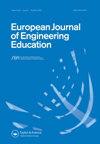一套衡量儿童在工程相关活动和技能方面的成就信念的措施
IF 2.8
Q2 EDUCATION & EDUCATIONAL RESEARCH
引用次数: 2
摘要
为了了解与成就、坚持和表现相关的选择对科学、技术、工程和数学领域的职业追求的影响,目前的研究采用了一种新颖的方法来询问幼儿与工程相关的信念。开发了工程相关活动和技能(ERAS)项目,以取代术语“工程”来衡量儿童与成就相关的能力信念(能力)和主观任务价值观(重要性,兴趣)。在能力信念和主观任务价值的领域中,三个研究采用了一系列方法来开发和评估与ERAS项目内部结构相关的证据(N = 949名学生)。结果表明,ERAS项目在测量儿童对工程相关能力、重要性和兴趣的感知方面是有效的。概述了影响科学、技术、工程和数学(STEM)领域学术和职业选择的因素以及未来方向的理论和实践意义。本文章由计算机程序翻译,如有差异,请以英文原文为准。
A suite of measures for children’s achievement beliefs in engineering-related activities and skills
ABSTRACT In the interest of understanding choices related to achievement, persistence, and performance that inform pursuit of careers in science, technology, engineering, and math, the current research pursued a novel approach to asking young children about their beliefs related to engineering. The Engineering-Related Activities and Skills (ERAS) items were developed to use instead of the term ‘engineering’ to measure children’s achievement-related ability beliefs (competence) and subjective task values (importance, interest). A range of methods across three studies were implemented in the development and assessment of evidence related to the internal structure of the ERAS items across the domains of ability beliefs and subjective task values (N = 949 students). Results suggest initial evidence for the ERAS items being valid in measuring children’s perceptions of engineering-related competence, importance, and interest. Theoretical and practical implications related to the factors that influence the academic and career choices in the science, technology, engineering, and math (STEM) fields, as well as future directions are outlined.
求助全文
通过发布文献求助,成功后即可免费获取论文全文。
去求助
来源期刊

European Journal of Engineering Education
EDUCATION & EDUCATIONAL RESEARCH-
CiteScore
7.30
自引率
13.00%
发文量
64
期刊介绍:
European Journal of Engineering Education is published six times a year in print and electronic editions and provides an essential forum for dialogue between researchers and specialists in the field of engineering education, at European and worldwide levels. European Journal of Engineering Education is the Official Journal of SEFI, the Socièté Européenne pour la Formation des Ingénieurs (the European Society for Engineering Education). SEFI is a non-governmental organization whose aims are to develop information about engineering education, to improve communication and exchange between professors, researchers and students and to promote cooperation between the various institutions concerned with engineering education.
 求助内容:
求助内容: 应助结果提醒方式:
应助结果提醒方式:


